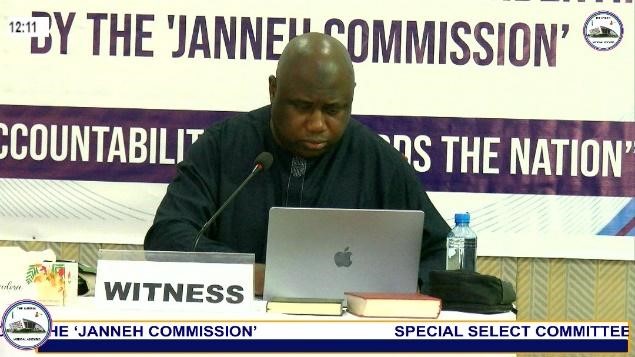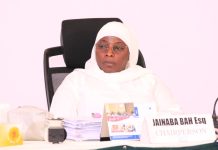By Kebba AF Touray
The Attorney General and Minister of Justice Dawda A. Jallow faced questions from the National Assembly’s Special Committee on Monday, July 14, 2025, in a highly anticipated public session probing the sale of assets belonging to former President Yahya A.J.J. Jammeh. Appearing as the first witness, the country’s top legal official took a cautious stance, distancing himself from the formation and decision-making of the commission tasked with managing Jammeh’s seized properties.
The session marked the opening of the inquiry, as Lead Counsel Lamin Dibba led the questioning through a wide-ranging review of legal instruments, court rulings, and institutional roles. The Attorney General, who assumed office after the formation of the original commission, repeatedly stated he was not privy to the reasoning behind its establishment and was unfamiliar with many details surrounding its staffing, structure, and operations.
On the issue of the commission’s creation, AG Jallow said his knowledge was limited to what was contained in the three-paragraph recitals of the legal notice. “Anything outside of that I don’t know because I have never interacted with anybody to find out what was the rationale because I was not in office at the time it was created,” he said.
Referring to the preamble of the legal notice, the Attorney General said preliminary reports from key public institutions — including the Central Bank of The Gambia, SSHFC, GPA, GAMTEL, NAWEC, AMRC, GNPC, and others — indicated that “substantial funds were either directly or indirectly withdrawn, paid out or expended on instructions or directives received from the office of the President during the tenure in office of former President Jammeh, sometimes for unknown purposes.”
When asked why the government opted to establish a commission of inquiry rather than assigning the task to institutions like the Auditor General or the Inspector General of Police, Jallow replied that he was not in a position to explain the decision. “I never expected I will be giving evidence on the mind of the Ministry for the time that I was not in the Ministry,” he said. “Unless it is memorialized in written, then I can search for those documents, but what was the thinking at the time, I don’t think I am competent to testify to that.”
Lead Counsel Dibba interjected, reminding the AG that the Ministry is a continuous institution and therefore should have institutional memory. He also reminded Jallow that he had undertaken to provide any relevant records, should they exist. Dibba clarified that if the AG believed he was not the appropriate witness to speak on the Ministry’s thinking, the committee would instead treat the response as the AG’s personal opinion.
The Attorney General maintained his position, asserting that he was not in the Ministry at the time and therefore could not speak to the rationale behind decisions made then. The committee subsequently requested that the AG provide documentary records that may help shed light on the decision-making process.
Attention then shifted to a High Court ruling issued on May 22, 2017, concerning the custody of assets linked to the former President. Counsel Dibba pointed to the ruling and asked the AG to guide the committee through its details. Jallow explained that the ruling was an interim court order under which Augustus Prom was appointed as receiver. The decision categorized assets, assigning some to institutions like the Gambia Livestock Management Agency (GLMA).
Jallow explained, “The animals were put in the hands of GLMA.” He noted that the interim order was meant to last for 180 days. When asked if the order was ever extended, he replied: “No.”
The committee also examined the custodianship of other assets, including those placed under the care of the Registrar General. The AG confirmed this arrangement, and when asked who the Registrar General was at the time, he said: “It is safer that I confirm and formally submit to the committee.”
Turning to Legal Notice Number 15 of 2017, Counsel Dibba referred to clauses 1, 5, and 6, which give the President the authority to appoint commissioners and the Commission Secretary. He asked the AG to explain the considerations used during such appointments. The AG responded that while specific qualifications were prescribed, factors like character and competence were generally taken into account when appointing individuals to serve.
On the Terms of Reference (ToR) of the commission, the AG clarified that there were none for individual commissioners. “The ToR I have seen is for the Commission,” he stated. He added that the commission’s general role was to investigate, make findings, and provide recommendations to the government.
Asked whether the Ministry of Justice advises the President on appointments to commissions, Jallow said such advice is normally limited to legal practitioners who might serve either on the commission or as legal counsel. When asked if this applied to the commission on Jammeh’s assets, Jallow said, “For this commission I don’t know.”
The committee then inquired into the commission’s staffing and human resources capacity. The AG said he had not looked into that aspect. “Other than the Lead Counsel and the Secretary, how other staff are either staffed or recruited — I have not looked into that,” he said.
When asked whether other personnel were seconded from institutions, the AG said he had heard that police officers were assisting with investigations and that some Ministry of Justice lawyers were also involved. “Some of whom I have seen and know them, but how they got there, I don’t know,” he said.
In concluding, members of the committee requested the Attorney General to provide several documents, including the Terms of Reference of the commission and any additional relevant material, which they said are crucial for advancing the inquiry.
Monday’s testimony marked the beginning of what many expect to be a detailed and possibly contentious process to trace the trail of Jammeh’s seized wealth. The next session is scheduled to continue on Tuesday at 10:00 a.m., with further testimony and documentation expected to help the committee piece together the fate of assets once held by The Gambia’s former leader.



















